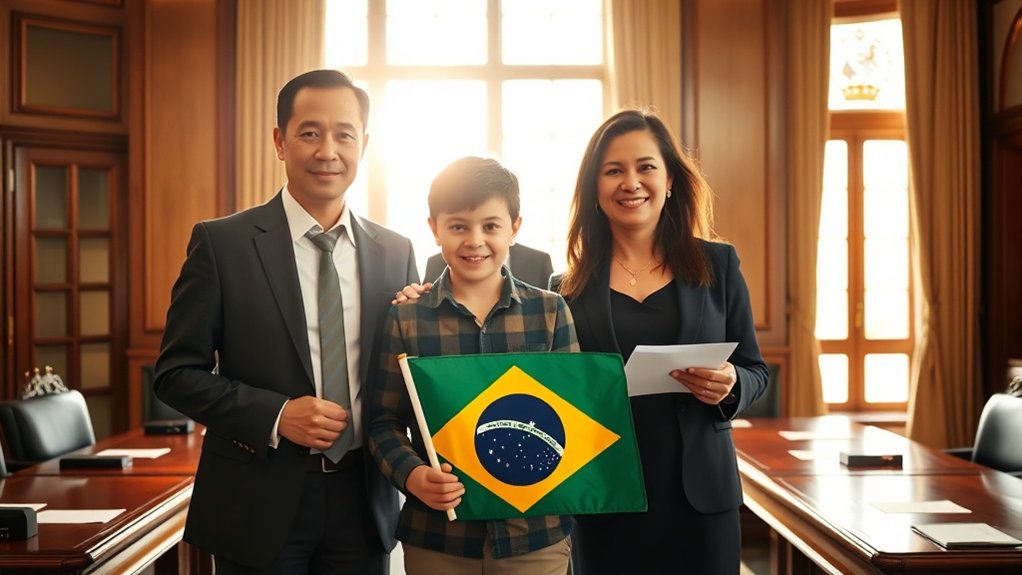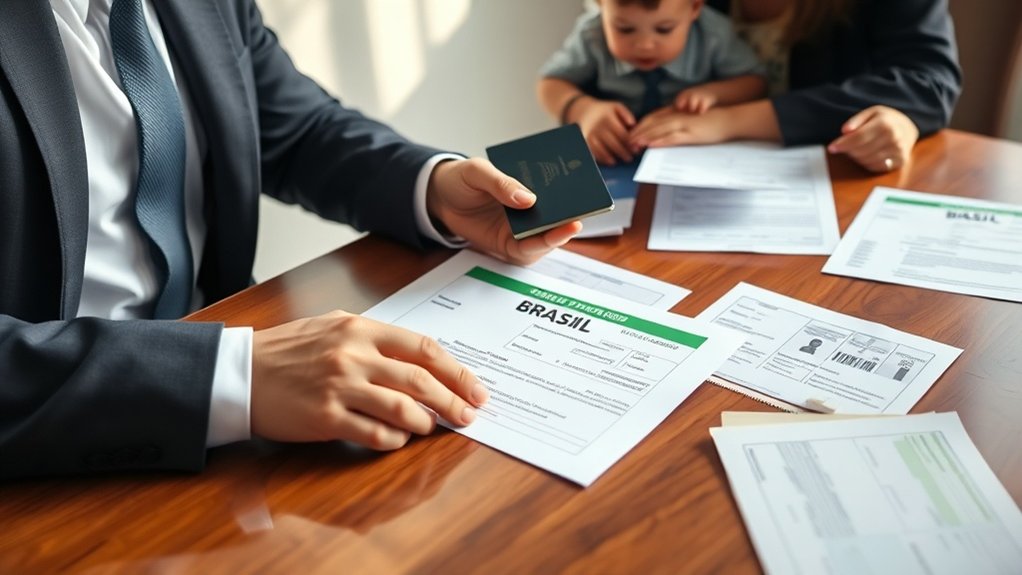If you’re a foreign parent of a Brazilian child, you might wonder how you can secure legal residency in Brazil. Vieira Braga Advogados specializes in turning that possibility into reality, guiding you through the complex legal landscape with precision. With immigration laws often changing and paperwork piling up, having expert support can make all the difference. Before you decide your next move, it’s important to understand why this legal route makes sense for families like yours…
Understanding Residency Rights for Parents of Brazilian Citizens

If you’re the parent of a Brazilian citizen, you may have the right to live legally in Brazil. This opportunity is especially relevant if your child is a minor, as Brazilian law recognizes the importance of family unity and your role in your child’s upbringing. By having a Brazilian child, you can apply for residency that lets you remain in the country, support your family, and participate fully in your child’s daily life.
You don’t have to be married to the child’s other parent or even live together. As long as your child is a Brazilian citizen, you’re eligible to seek residency as their parent. This right applies whether your child was born in Brazil or acquired citizenship through another process. Understanding these rights gives you a clear pathway to stability and legal status in Brazil, ensuring you can stay close to your child and fulfill your parenting responsibilities. Seeking specialized legal support can help you avoid mistakes and ensure your application process is compliant with current immigration laws.
The Legal Framework Behind Parent Residency Applications
You’ll need to understand how Brazilian immigration law shapes your path to residency as a parent. The law sets specific criteria for parents applying based on their Brazilian child’s citizenship. Let’s look at what these rules require and how they affect your application. Seeking specialized legal assistance can help you navigate these complex requirements and avoid delays or mistakes in your residency process.
Brazilian Immigration Law Provisions
Although Brazil has a reputation for its welcoming approach to immigrants, its legal framework for granting residency to parents of Brazilian children is specific and structured. You’ll find that Brazilian immigration law is grounded in federal statutes, especially the Migration Law (Law No. 13,445/2017), and is further regulated by decrees and administrative resolutions. When you apply for residency as a parent, you must navigate these legal provisions, which define your eligibility and obligations. Here’s a quick breakdown of the foundational elements you’ll encounter:
| Key Provision | Description |
|---|---|
| Migration Law | Sets the overall rules for entry, stay, and residency |
| Normative Resolutions | Outline application procedures and documentation |
| Ministry of Justice Oversight | Supervises and enforces immigration processes |
| Equal Rights Principle | Grants foreign parents rights similar to Brazilian nationals |
| Family Unity Emphasis | Prioritizes keeping families together in immigration decisions |
Seeking expert guidance from an immigration lawyer can help you understand these requirements in detail and avoid common pitfalls during the application process.
Child-Based Residency Criteria
When seeking residency in Brazil through your Brazilian child, the law requires you to meet certain clear criteria. First, you must prove the child is indeed your biological or legally recognized child and holds Brazilian citizenship. You’ll need to provide official documents, such as a birth certificate registered in Brazil. Authorities also expect you to demonstrate active parental responsibility. This means showing involvement in your child’s care, support, and upbringing.
Additionally, you must not have a criminal record in Brazil or your country of origin. Immigration officials may ask for proof of current residence and financial stability to ensure you can support your child. Meeting all these requirements increases your chances of approval, securing your legal status while upholding the child’s welfare and rights. Consulting with an immigration lawyer can help you navigate complex and changing immigration laws to ensure your application is handled correctly.
Common Challenges Faced by Foreign Parents in Brazil

As you start your residency process, you’ll quickly notice how complex the documentation requirements can be. If you’re not fluent in Portuguese or familiar with Brazilian laws, language and legal barriers might slow you down. These challenges can make each step feel more overwhelming than expected. Many foreign parents also face strict documentation requirements that, if not properly addressed, can lead to delays or even denial of their residency applications.
Securing residency in Brazil through your child often feels overwhelming, especially once you encounter the country’s strict documentation requirements. You’ll need to gather a range of documents, including your child’s Brazilian birth certificate, proof of paternity or maternity, your valid passport, and evidence of your legal entry into Brazil. Each document must be up-to-date and, if issued abroad, translated by a sworn translator and legalized or apostilled. Missing signatures, expired papers, or incomplete forms can cause delays or rejections. You must also provide recent photos and pay government fees. Keeping track of deadlines and required originals versus copies is essential. If you’re not organized from the start, you risk setbacks that could prolong the process and add unnecessary stress to your application. Working with an immigration lawyer can help you avoid common challenges and ensure your application complies with all requirements.
Language and Legal Barriers
Although Brazil is known for its warmth and hospitality, the language barrier can quickly become a major obstacle for foreign parents seeking residency through their child. If you don’t speak Portuguese fluently, you’ll likely struggle to understand official documents, legal terms, and bureaucratic procedures. Conversations with government officials or lawyers can feel overwhelming, especially when dealing with complex requirements or strict deadlines.
Legal barriers also pose significant challenges. Brazilian immigration law includes intricate regulations that can change without much notice. If you’re not familiar with local legal practices, you risk making errors during your application process—errors that might delay or jeopardize your residency status. That’s why many foreign parents seek guidance from experienced legal professionals who can bridge both the language and legal gaps efficiently. Seeking professional support ensures not only accurate documentation but also a smoother navigation through Brazil’s constantly evolving immigration regulations.
How Vieira Braga Advogados Simplifies the Application Process
Whether you’re just starting to consider residency through your Brazilian child or you’re feeling overwhelmed by the paperwork, Vieira Braga Advogados streamlines every step. They know the system inside and out, so you won’t get lost in confusing procedures or bureaucratic delays. From your first consultation, they’ll map out a clear strategy tailored to your situation. You’ll always know what comes next, and they’ll keep the process moving forward efficiently.
Instead of juggling appointments and deadlines on your own, you’ll have a team that coordinates everything—so you won’t miss critical steps or waste time on unnecessary tasks. They’ll handle the communication with authorities, organize your application, and make sure you meet every requirement. This approach minimizes stress and reduces the risk of setbacks. With their help, you can focus on your family and future in Brazil, knowing your residency process is in trusted hands. With the support of their personalized case analysis, you’ll benefit from careful document preparation and expert guidance tailored specifically to the requirements of Brazilian immigration law.
Expert Guidance on Required Documentation

You’ll need to gather specific documents, starting with your own identification papers and your child’s Brazilian birth certificate. Each item must meet strict legal standards, so accuracy is key. Let’s look at what’s required and how expert advice ensures you’re prepared. Consulting a lawyer can help streamline the documentation process and ensure compliance with all legal requirements, reducing the risk of delays or denials.
Essential Parental Identification Papers
To successfully apply for residency through your Brazilian child, you’ll need to gather specific identification documents that prove your identity and relationship. Start by preparing your valid passport, making sure it’s current and not close to expiring. If you’re married, include your marriage certificate, as it may support your case. You’ll also need your own birth certificate, which helps verify your identity and citizenship. Official translations into Portuguese and proper notarization are typically required for all foreign documents. Don’t forget to bring official identification from your home country and any Brazilian ID cards you may have. Keep copies of every document and ensure they’re clear and legible. Organized documentation speeds up the residency process and minimizes the risk of unnecessary delays or complications. As part of the overall documentation for U.S. immigration, being thorough with your paperwork demonstrates preparedness and helps avoid common setbacks.
Child’s Birth Certificate Requirements
Since your child’s birth certificate is the cornerstone of your residency application, make sure you present the official, full-length version issued by the Brazilian civil registry (cartório). Only this document proves your direct parental relationship and your child’s Brazilian nationality—essential elements for your application. Photocopies, hospital records, or abbreviated certificates won’t be accepted. If your certificate isn’t in Portuguese, you’ll need a sworn translation completed in Brazil. To avoid bureaucratic delays, double-check that the document is current and legible.
Here’s what you need to confirm:
- The birth certificate is the official, full-length version from the cartório.
- If applicable, a sworn translation into Portuguese (feita no Brasil).
- All information—names, dates, and registry details—is clear, complete, and matches your identification papers.
Personalized Strategies for Complex Family Situations
When families face unique challenges—like separated parents, blended households, or guardianship concerns—navigating residency through a Brazilian child demands tailored solutions. You’ll need to address specific circumstances that may affect your application. For example, if you’re a separated parent, you might have to present legal documentation proving your parental relationship and your involvement in the child’s life. Blended families often require additional proof of familial bonds, especially if step-parents seek residency rights.
If guardianship is in question, you’ll need to show clear legal authority or court orders establishing your role. Each situation requires careful documentation, such as custody agreements, declarations from both parents, or official guardianship papers. Personalized strategies ensure that your application reflects your family’s reality, anticipating questions or concerns immigration authorities might raise. Working with experienced legal professionals, you’ll develop a plan that addresses your family’s complexities and streamlines your path to residency.
Ensuring Compliance With Brazilian Immigration Laws

Although the process of obtaining residency through a Brazilian child offers a clear legal pathway, you’ll need to pay close attention to the country’s immigration requirements at every step. Brazilian authorities expect you to meet strict documentation standards, follow legal timelines, and update officials if your circumstances change. Overlooking any detail can delay your application or even result in denial. You should stay informed about policy changes, as immigration laws can shift and affect your eligibility or obligations.
Here are three critical compliance points you must keep in mind:
- Submit Accurate Documentation: All forms, birth certificates, and proof of parentage must be properly translated and notarized.
- Meet Residency Requirements: You’ll need to demonstrate your intent to reside in Brazil and maintain legal status during the process.
- Report Changes Promptly: Notify immigration authorities immediately if your address, marital status, or family situation changes.
Staying compliant helps prevent setbacks and ensures a smoother residency process.
Success Stories From Families Assisted by the Firm
Staying on top of Brazil’s immigration rules can feel overwhelming, but real families have navigated this path with success. When you hear about others who’ve gone through the process, it’s easier to see what’s possible for your own family. For example, one couple from Argentina secured residency after their Brazilian child was born, allowing them to work and stay united in Brazil without fear of deportation. Another parent, facing expiring visas and employment challenges, found stability for herself and her child by obtaining residency through the firm’s guidance.
You’ll see stories where families overcame bureaucratic delays thanks to clear communication and proactive document handling. Some clients reunited with loved ones after years of uncertainty, while others finally accessed healthcare and educational benefits. These successes didn’t come without effort, but with each step, families gained confidence and peace of mind. Their journeys prove you can achieve legal residency through your Brazilian child.
The Importance of Professional Representation in Immigration Matters

Navigating Brazil’s immigration system on your own can lead to costly mistakes and unnecessary delays. Immigration laws are complex and change frequently, making it challenging to stay informed and compliant. When you’re applying for residency through your Brazilian child, you want every detail to be correct from the start. Hiring professional legal representation, like Vieira Braga Advogados, ensures your case is handled with expertise and care. Experienced immigration lawyers know how to avoid pitfalls and can present your case in the best possible light.
With professional support, you benefit from:
- Accurate Documentation: Lawyers check all your paperwork, reducing the risk of errors that could jeopardize your application.
- Timely Submission: Professionals keep track of deadlines, so your process moves forward without unnecessary delays.
- Expert Guidance: You get personalized advice tailored to your unique situation, ensuring you understand each step and your rights throughout the process.
Next Steps for Parents Seeking Legal Residency in Brazil
Once you’ve decided to pursue residency in Brazil through your child, it’s essential to understand the practical steps ahead. First, gather all necessary documents, such as your child’s Brazilian birth certificate, your identification, and proof of parentage. Next, schedule an appointment with the Brazilian immigration authority (Polícia Federal) to submit your residency application. Don’t forget to have all foreign documents officially translated and legalized.
You’ll also need to fill out the appropriate immigration forms and pay the application fees. Keep in mind that requirements can change, so always check the latest guidelines before submitting your paperwork. After applying, track your application status and respond promptly to any requests for additional information.
Consulting an experienced immigration lawyer, like those at Vieira Braga Advogados, helps you navigate any unexpected hurdles. Their guidance ensures your application is complete and compliant, greatly increasing your chances of a successful residency approval.
Frequently Asked Questions
How Long Does It Take to Receive Residency After Application Submission?
After you submit your residency application, you can usually expect to wait between six months and one year for a decision. Processing times can vary depending on the local immigration office, the completeness of your documents, and any specific circumstances related to your case. Make sure you check your application status regularly and respond quickly to any requests for additional information so you don’t experience unnecessary delays during the process.
Can Both Parents Apply for Residency if Only One Child Is Brazilian?
Yes, both parents can apply for residency if only one child is Brazilian. You’ll need to show proof of your relationship to the child and demonstrate that you play an active role in their life. Each parent must submit their own application, but having a Brazilian child qualifies you both for family-based residency. Make sure you gather all required documents and follow the application procedures carefully to avoid any delays.
What Happens if the Brazilian Child Is Adopted?
If your child is Brazilian through adoption, you still have the right to apply for residency in Brazil. Brazilian law recognizes adopted children as equal to biological children, so you can follow the same process. You’ll need to show legal proof of the adoption and your relationship. As an adoptive parent, you can apply for permanent residency, and both you and your spouse can benefit from your Brazilian-adopted child’s citizenship status.
Is Residency Status Affected if the Child Leaves Brazil?
If your Brazilian child leaves Brazil, your residency status can be affected, especially if your residency is based on family reunification. Authorities may question the purpose of your stay if your child no longer resides in the country. You’ll need to prove ongoing ties or continued parental responsibility. Always keep immigration updated and consult legal help to ensure you maintain your residency status even if your child is living abroad.
Are There Language Requirements for Parent Applicants?
You don’t need to meet any specific language requirements when applying for residency in Brazil as a parent of a Brazilian child. The process focuses more on your relationship with your child and your intention to live in Brazil. While Portuguese skills can help you integrate and navigate daily life, authorities won’t require you to pass a language test as part of your residency application. You’re free to apply regardless of your language proficiency.
Conclusion
Choosing Vieira Braga Advogados means you’re not navigating Brazil’s complex immigration system alone. With their expertise, you’ll have peace of mind knowing every detail—from paperwork to legal compliance—is handled efficiently. You can focus on your family’s new chapter in Brazil while they manage the bureaucratic hurdles. If you’re ready to secure legal residency through your Brazilian child, reach out to Vieira Braga Advogados and let experienced professionals guide you every step of the way.



